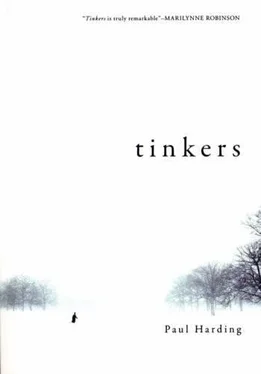
© 2009
For Meg, Samuel, and Benjamin
GEORGE WASHINGTON CROSBY BEGAN TO hallucinate eight days before he died. From the rented hospital bed, placed in the middle of his own living room, he saw insects running in and out of imaginary cracks in the ceiling plaster. The panes in the windows, once snugly pointed and glazed, stood loose in their sashes. The next stiff breeze would topple them all and they would flop onto the heads of his family, who sat on the couch and the love seat and the kitchen chairs his wife had brought in to accommodate everyone. The torrent of panes would drive everyone from the room, his grandchildren in from Kansas and Atlanta and Seattle, his sister in from Florida, and he would be marooned on his bed in a moat of shattered glass. Pollen and sparrows, rain and the intrepid squirrels he had spent half of his life keeping out of the bird feeders would breach the house.
He had built the house himself-poured the foundation, raised the frame, joined the pipes, run the wires, plastered the walls, and painted the rooms. Lightning struck once when he was in the open foundation, soldering the last joint of the hot-water tank. It threw him to the opposite wall. He got up and finished the joint. Cracks in his plaster did not stay cracks; clogged pipes got routed; peeling clapboard got scraped and slathered with a new coat of paint.
Get some plaster, he said, propped up in the bed, which looked odd and institutional among the Persian rugs and Colonial furniture and dozens of antique clocks. Get some plaster. Jesus, some plaster and some wires and a couple of hooks. You'd be all set for about five bucks.
Yes, Gramp, they said.
Yes, Dad. A breeze blew through the open window behind him and cleared exhausted heads. Bocce balls clicked out on the lawn.
Noon found him momentarily alone, while the family prepared lunch in the kitchen. The cracks in the ceiling widened into gaps. The locked wheels of his bed sank into new fault lines opening in the oak floor beneath the rug. At any moment, the floor was going to give. His useless stomach would jump in his chest as if he were on a ride at the Topsfield Fair and with a spine-snapping jolt he and the bed would land in the basement, on top of the crushed ruins of his workshop. George imagined what he would see, as if the collapse had, in fact, already happened: the living room ceiling, now two stories high, a ragged funnel of splintered floorboards, bent copper pipes, and electrical wires that looked like severed veins bordering the walls and pointing towards him in the center of all of that sudden ruin. Voices murmured out in the kitchen.
George turned his head, hoping someone might be sitting just out of view, with a paper plate of potato salad and rolled slices of roast beef on her lap and a plastic cup of ginger ale in her hand. But the ruin persisted. He thought he called out, but the women's voices in the kitchen and the men's voices in the yard hummed uninterrupted. He lay on his heap of wreckage, looking up.
The second floor fell on him, with its unfinished pine framing and dead-end plumbing (the capped pipes never joined to the sink and toilet he had once intended to install) and racks of old coats and boxes of forgotten board games and puzzles and broken toys and bags of family pictures-some so old they were exposed on tin plates-all of it came crashing down into the cellar, he unable to even raise a hand to protect his face.
But he was nearly a ghost, almost made of nothing, and so the wood and metal and sheaves of brightly printed cardboard and paper (MOVE FORWARD SIX SPACES TO EASY STREET! Great-Grammy Noddin, shawled and stiff and frowning at the camera, absurd with her hat that looked like a sailor's funeral mound, heaped with flowers and netting), which otherwise would have crushed his bones, dropped on him and fell away like movie props, he or they facsimiles of former, actual things.
There he lay among the graduation photos and old wool jackets and rusted tools and newspaper clippings about his promotion to head of the mechanical-drawing department at the local high school, and then about his appointment as director of guidance, and then about his retirement and subsequent life as a trader and repairer of antique clocks. The mangled brass works of the clocks he had been repairing were strewn among the mess. He looked up three stories to the exposed support beams of the roof and the plump silver-backed batts of insulation that ran between them. One grandson or another (which?) had stapled the insulation into place years ago and now two or three lengths of it had come loose and lolled down like pink woolly tongues.
The roof collapsed, sending down a fresh avalanche of wood and nails, tarpaper and shingles and insulation. There was the sky, filled with flat-topped clouds, cruising like a fleet of anvils across the blue. George had the watery, raw feeling of being outdoors when you are sick. The clouds halted, paused for an instant, and plummeted onto his head.
The very blue of the sky followed, draining from the heights into that cluttered concrete socket. Next fell the stars, tinkling about him like the ornaments of heaven shaken loose. Finally, the black vastation itself came untacked and draped over the entire heap, covering George's confused obliteration.
Nearly seventy years before George died, his father, Howard Aaron Crosby, drove a wagon for his living. It was a wooden wagon. It was a chest of drawers mounted on two axles and wooden spoked wheels. There were dozens of drawers, each fitted with a recessed brass ring, pulled open with a hooked forefinger, that contained brushes and wood oil, tooth powder and nylon stockings, shaving soap and straight-edge razors. There were drawers with shoe shine and boot strings, broom handles and mop heads. There was a secret drawer where he kept four bottles of gin. Mostly, back roads were his route, dirt tracks that ran into the deep woods to hidden clearings where a log cabin sat among sawdust and tree stumps and a woman in a plain dress and hair pulled back so tight that she looked as if she were smiling (which she was not) stood in a crooked doorway with a cocked squirrel gun. Oh, it's you, Howard. Well, I guess I need one of your tin buckets. In the summer, he sniffed heather and sang someone's rocking my dreamboat and watched the monarch butterflies (butter fires, flutter flames; he imagined himself somewhat of a poet) up from Mexico. Spring and fall were his most prosperous times, fall because the backwoods people stocked up for the winter (he piled goods from the cart onto blazing maple leaves), spring because they had been out of sup plies often for weeks before the roads were passable for his first rounds. Then they came to the wagon like sleepwalkers: bright-eyed and ravenous. Sometimes he came out of the woods with orders for coffins-a child, a wife wrapped up in burlap and stiff in the woodshed.
He tinkered. Tin pots, wrought iron. Solder melted and cupped in a clay dam. Quicksilver patchwork. Occasionally, a pot hammered back flat, the tinkle of tin sibilant, tiny beneath the lid of the boreal forest. Tinkerbird, coppersmith, but mostly a brush and mop drummer.
George could dig and pour the concrete basement for a house. He could saw the lumber and nail the frame. He could wire the rooms and fit the plumbing. He could hang the drywall. He could lay the floors and shingle the roof. He could build the brick steps. He could point the windows and paint the sashes. But he could not throw a ball or walk a mile; he hated exercise, and once he took early retirement at sixty he never had his heart rate up again if he could help it, and even then only if it were to whack through some heavy brush to get to a good trout pool. Lack of exercise might have been the reason that, when he had his first radiation treatment for the cancer in his groin, his legs swelled up like two dead seals on a beach and then turned as hard as lumber. Before he was bedridden, he walked as if he were an amputee from a war that predated modern prosthetics; he tottered as if two hardwood legs hinged with iron pins were buckled to his waist. When his wife touched his legs at night in bed, through his pajamas, she thought of oak or maple and had to make herself think of something else in order not to imagine going down to his workshop in the basement and getting sandpaper and stain and sanding his legs and staining them with a brush, as if they belonged to a piece of furniture. Once, she snorted out loud, trying to stifle a laugh, when she thought, My husband, the table. She felt so bad afterward that she wept.
Читать дальше













